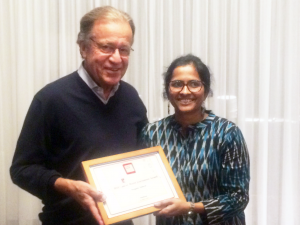What’s the real story? This month Cancer World launches its latest Journalism Award, and it’s more important than it’s ever been. A year ago, the overall winner of the last award explained why it meant so much to her.
“I am glad that the voices of the poorest Indian cancer patients are heard across the world and I hope there is an improvement in their access to treatment,” said Swagata Yadavar, who wrote about India’s growing cancer care crisis. She dedicated her award to the hundreds of patients camping outside the Tata Memorial Hospital in Mumbai, many of whom she interviewed for her article. Without a bit of good journalism, their voices and stories would never have been heard.

Whether or not you believe that we’re living in a “post-truth” world, there’s no doubt that we’re increasingly aware of how hard it is to know what’s really happening – given that so many people are presenting their own version of reality.
This is as true in medicine as any other field. Most of us have moments of despair at the “partial truths” presented in published trial evidence, for example, or the selective use of data to suggest the success of a service or procedure. It’s hard to know where vested interests begin and end.
That’s why good journalism is desperately needed in the field of cancer. It can provide an outsider’s view of what’s happening, without the influence of self-interest. And it can give a voice to the people who often aren’t in the privileged position to put their case.
Laure Andrillon, a category winner last year for her article about the experiences of women who had mastectomy without reconstruction, said: “The idea that many, many more people from all over the world will read these women’s stories makes me proud. As a young freelancer, I feel even more honoured by this recognition. It encourages me to keep reporting about the taboos and body image issues that are related to cancer.”
Good journalism can also cut through the “official” line, or uncover inconvenient truths about cancer. For example, Faiza Ilyas won the prevention category in the last awards for her story in the Pakistan newspaper Dawn about lack of government recognition of an oral cancer epidemic due to gutka and paan consumption.
The European School of Oncology has recognised the importance of good journalism as a force to improve cancer care since it launched the first Cancer World journalism awards scheme in 2006. Today, as an independent cancer education body, it recognises the importance of supporting those who want to independently investigate the world of cancer. Journalists’ articles and broadcasts can bring positive change for people with cancer because they break through complacencies and assumptions about services, treatment and experience – and force influencers to stop, listen and change.
“It is extremely encouraging that so many journalists around the world are working to reveal the realities of cancer care in their countries, explain science clearly, and accurately represent the experience of patients,” says Alberto Costa, Cancer World Editor.
We encourage journalists all over the world to be proud of their work in the field of cancer, and to submit entries to this year’s Cancer World Journalism Awards. You can find details of how to enter here.
Please feel free to reproduce this article if you want to promote the award.


